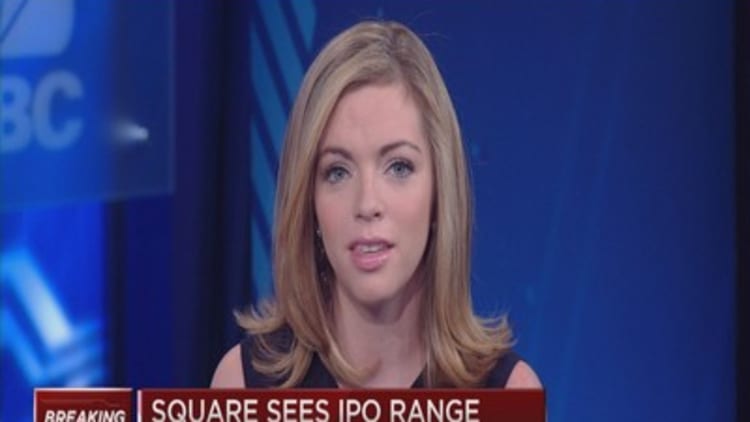
When Square starts selling shares in its initial public offering (IPO), Silicon Valley powerhouse Khosla Ventures may see a huge windfall of $657 million — at least on paper.
That estimate comes courtesy of research from EquityZen, and assumes that Square prices its IPO at $13 per share, the top end of the expected range.
Read MoreSquare's IPO cuts company's valuation
In 2009, Vinod Khosla's venture firm led a $10 million investment round, valuing shares at 22 cents each. The $10 million investment gave the company a $40 million valuation, before it had even launched its square-shaped mobile credit card swipers to the public.
Now, Khosla Ventures stands to make back its investment almost 60 times over. The firm was investing out of a $1 billion fund, and the Square investment alone will return 60 percent of the fund.
At the time, Khosla was betting that Square co-founder and CEO Jack Dorsey, who also co-founded Twitter, would transform yet another industry: the payments business. Khosla made subsequent investments, ultimately ending up with 50.5 million shares, or about 15 percent ownership.
The only investor with a bigger stake than Khosla is Dorsey himself, who owns 21.9 percent. His co-founder James McKelvey controls 8.4 percent. A $13 offering would value their stakes at $924.6 million and $355.5 million, respectively.
Of course, their actual returns will depend on how well the stock performs on the open market. Executives and early investors are prohibited from selling shares until six months after the IPO, during which time the stock can be affected by financial performance, macroeconomic concerns, or any number of other issues.
Here's who else stands to win from Square's debut:
Sequoia Capital can expect a return of $204.5 million thanks to its participation in two rounds of funding, buying in at 72 cents per share and 95 cents per share. Partner Roelof Botha, who was PayPal's CFO, also joined the company's board. Sequoia has 15.7 million shares.
Kleiner Perkins Caufield & Byers led Square's Series C round, paying $5.80 per share. The firm currently owns 8.6 million shares. That means to a theoretical return of $112 million.
Rizvi Traverse, which also owns a large Twitter stake, led Square's Series D round in September 2012. The firm paid $11.01 per share and now owns 15.9 million shares. Those shares could be worth $206.7 million.
JP Morgan also invested in that round. It has 16.4 million shares which could be valued at $212.8 million at the IPO..
The last round of funding, at a reported $6 billion valuation, is looking risky at the moment. In late 2014, Singapore wealth fund GIC was the lead investor in Square's most recent funding round, which raised $150 million at $15.46 a share, well above the given pricing range. Those investors will need a healthy rally to make a profit.
Tricky math
Reconciling private market and public market valuations is tricky. When Square achieved a $6 billion valuation late last year, it did so by selling shares at $15.46 apiece. To get to $6 billion, you have to multiply $15.46 by the number of common and preferred shares outstanding, plus a bunch of options, warrants, restricted stock and convertible shares.
But the stock market capitalization only factors in common stock outstanding after the offering, not the other stuff. Based on Square's initial plan to sell 27 million shares, the company will have 322.9 million shares outstanding.
Even if the IPO price is $15.46—the same as the last private round—the market value would be about $5 billion, which is 17 percent below the last valuation.
"Tech companies often include their option pool when announcing their valuation as a private company. When the company goes public, however, market cap is calculated only on shares outstanding, and the option pool is not taken into account," said EquityZen Founder Phil Haslett.
"As a result, a private company 'worth' $6 billion could go public at the same share price as their $6 billion valuation and be valued at only $5 billion, or even $4.5 billion, after the IPO," he said.
Thus, even with a higher share price, the valuation can be lower.
—By CNBC's Harriet Taylor. Follow her on Twitter: @Harri8t






